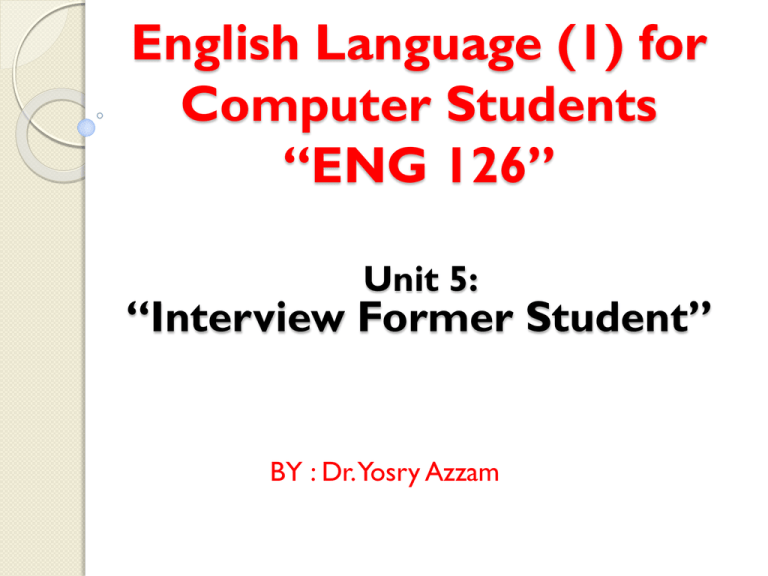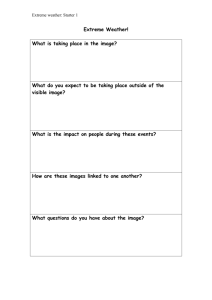Unit 5 Interview Former Student
advertisement

English Language (1) for Computer Students “ENG 126” Unit 5: “Interview Former Student” BY : Dr.Yosry Azzam 1- Starter Match a. LAN Topologies 6. Network Technology b. PC Bus Architectures 1. Computer Architecture c. Modems 10.Data Communications d. How to connect printers 2. HW Installation & Maintenance 1- Starter (Contd.) e. Unix Operating System 5. Multi-user Operating System f. Pascal 9.Software Development Procedural Lang. g. Writing a program 7. Software Development Life Cycle h. Creating a database 11. Information Systems & Services 1- Starter (Contd.) i. Maintenance of desktops Computer Architecture 8. Standalone Computer System Support j Word processing and other office applications 3 Info Tech Applications (1) k. Binary system 15 Mathematics for Computing l. Making presentations 13 Communication 3- Listening Part I Part II Part III 2 Listening 1. Which of the subject areas listed in Task 1 does Paul mention? HW Installation & Maintenance, Inf. Tech. applications, SW development and communication. 2. Which additional subjects does he mention? planning, design, and programming 3 Why did he choose to do his Diploma in support? There seemed to be more jobs in support , so support seemed a better career move. 2 Listening (Contd.) 4. What practical work was included in the course? Assembling computers 5. Which subject did he particularly enjoy? Maths. 3 Listening 1. What suggestions does Paul have for improving the course? Note a) his suggestions for improvement and b) the reasons he gives. Improvement Reason Change the programming component Perhaps to C++ Work Experience Pascal & COBOL are not in demand Employers are looking for it 3 Listening (Contd.) 2 Which of the subjects he studied has he found useful in his work? Note a) the subjects and b) examples in the work situation. Subject Example in work situation Learning Access To design databases for customers System building To assemble computers for customers Communication Making presentations to customers, job interviews 4 Listening 1. In which situations does Paul have to learn fast? When he has gone to customers who want something fixed that he doesn’t know about. 2 What sources does he use for help? Books, manuals, PC magazines, the Internet, Microsoft websites, and the manufacturer’s websites. 4 Listening (Contd.) 3. What advice did the college provide on sources of information? One lecturer gave the students some advice on where to look. 4. What was the problem with the set book? It was full of mistakes such that it had to be checked against other books. 4 Listening (Contd.) 5 How does he feel about going back to college? He had like to do a degree some time but it is difficult to get the time and money to do that. Language work: Past simple questions Study these examples of questions about the past. Asking about quantity: -How many days a week did you study? -How much programming did you do? Asking about time: -When did you study Communication? Language work: Past simple questions Asking about people: -Who taught you Maths? -Whose classes did you most enjoy? Asking about things: -What made you choose computing support? -What did you like most? Asking about actions: -What did you do on Fridays? -What happened on Monday mornings?? 5.Language work: What questions might the interviewer have asked to obtain the information in italics? 1- How many subjects did you study in your first term? 2- How many days each week did you have classes? 3- What did you have on Monday morning? 4- Which day was a free day for home study? 5- Where did you have Systems Analysis on Wednesday? 5.Language work: What questions might the interviewer have asked to obtain the information in italics? 6- What did you study on Thursday? 7- When did programming happen? 8- How often did communication take place? 9- Whose classes did you like most? 10- When did you have your lunch break? 6. Word Study: UP- and –UP verbs 1.To avoid losing data, you should back up your files regularly. 2.You can upgrade your PC by adding a new motherboard. 3. Delete some files to free up space on your hard disk. 4. Data is uploaded from regional PCs to the company's mainframe each night. 5.The operating system boots when you start up your computer. 6. She's taking a course to update her knowledge of computing. 6. Word Study: UP- and –UP verbs 7. The computer checks the memory when it starts up. 8. He set up a website to advertise his travel company. 9.You can keep up/ catch up with developments by reading PC magazines. 10. If you miss a class, you can study the hand-outs to keep up/ catch up. 11. The image in a digital camera is built up from a red, green and blue image. 7. Speaking Role Play: Work in pairs. Using the tapescript for Part 1 of the interview, on page 196, play the parts of the Interviewer and Paul. 8. Writing Study the description of a computer course.Then write a description of your own computing course, or one of its components, in the same way.


